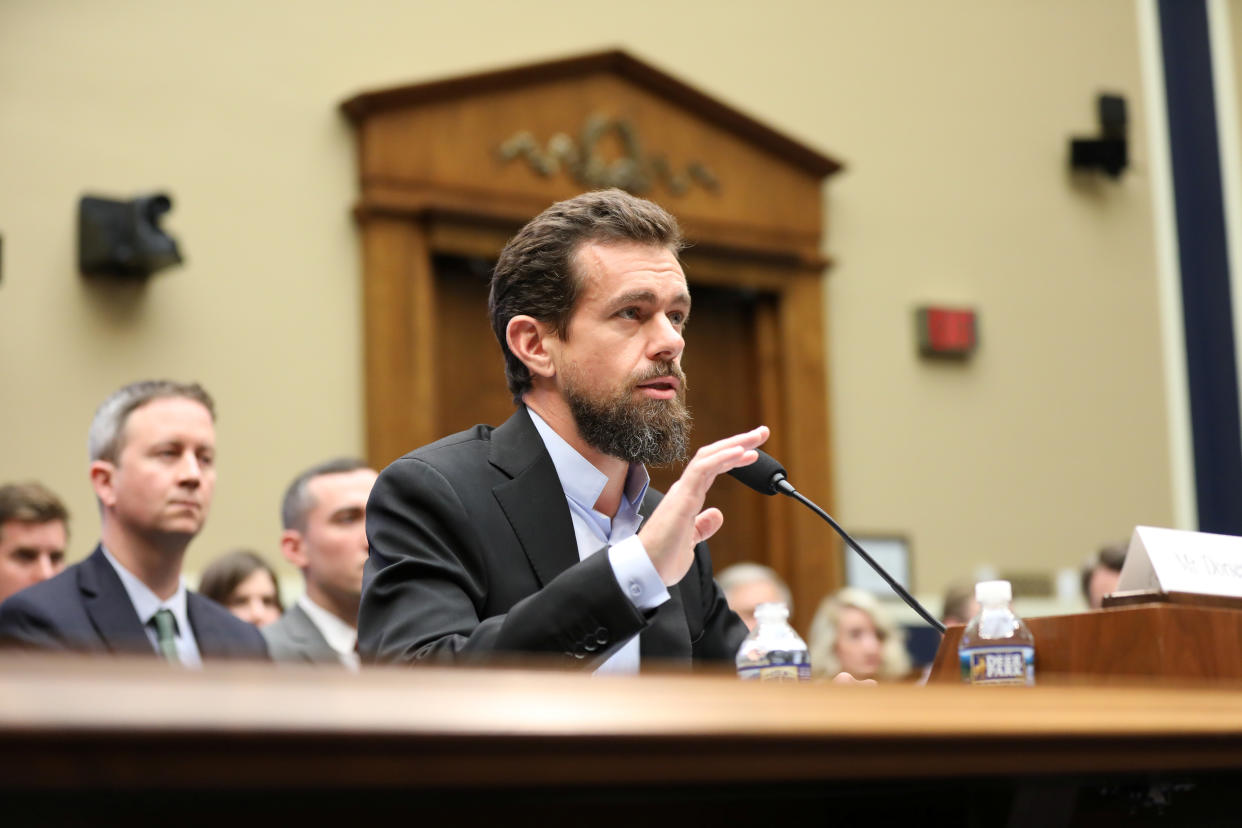Twitter CEO says company isn't 'shadow-banning' conservatives

WASHINGTON — Twitter CEO Jack Dorsey said Wednesday that his social media website had improperly screened an anti-abortion message, but insisted that the larger claim of “shadow-banning” conservatives was not politically motivated and has been corrected. (The term refers to the blocking of users of online communities in a way that they are unaware of being blocked.)
Dorsey told House Majority Whip Steve Scalise, R-La., that Twitter should not have blocked Republican congresswoman Marsha Blackburn last fall from placing video ads that touted her anti-abortion activism.
“This was a mistake, and we do apologize,” Dorsey said.
At the time, a Twitter employee told consultants to Blackburn’s campaign for the U.S. Senate in Tennessee that “the line in this video specific to ‘stopped the sale of baby body parts’ has been deemed an inflammatory statement that is likely to evoke a strong negative reaction.”
Blackburn was touting her work chairing a committee that investigated Planned Parenthood after anti-abortion activists released videotapes in 2015 that appeared to show officials with the group discussing the sale of fetal body tissue to health care providers.
The Twitter employee told the consultants that if Blackburn removed the language referring to Planned Parenthood and the sale of fetal body tissue then she could continue to pay Twitter to promote the ad on their site.
Scalise asked Dorsey if anyone at Twitter had been held accountable, and Dorsey did not answer.
Dorsey also talked at length during the more-than-four-hour hearing, after a two-hour Senate hearing earlier in the day, about how three Republican House members had been singled out for what critics have called shadow-banning. In this case, the congressmen’s names did not show up in the search window of Twitter due to a tweak to Twitter’s algorithm.

Vice News reported the development, which also affected Republican National Committee Chairman Ronna McDaniel, in late July. Twitter said then that their algorithmic testing had begun in May, and stopped using it the day after Vice’s report.
Dorsey said Wednesday that Twitter had begun filtering accounts out of the search results if the followers of those accounts were violating the terms of service. He said “about 600,000 accounts” were affected, but that Twitter decided the results of the test were “not fair,” and “we decided to correct it.”
“I assure you that the algorithm was not written with that intention,” Dorsey said, when asked by Scalise about the shadow-banning that affected only Republican representatives.
President Trump has used the shadow-banning incident to rail against social media and technology giants like Twitter, Facebook and Google in a series of tweets and statements in which he has said his administration will consider regulations to more tightly control these companies.
Alex Jones, known for promoting right-wing conspiracy theories, showed up at the Capitol on Wednesday and harassed Florida Sen. Marco Rubio in a hallway. Jones shouted at Rubio, claiming that the ban by Facebook and YouTube of Jones’s site InfoWars last month was similar to the Chinese government’s censoring of information.
Although he shouted about Twitter’s shadow-banning of conservatives, Twitter has not banned Jones.

Democrats repeatedly called the hearings in the House a partisan stunt designed to rile up the Republican base and to “please” Trump. The Senate hearing, which also included Facebook COO Sheryl Sandberg, was more bipartisan and less focused on political bias inherent in either company’s practices. That hearing was geared far more on preventing foreign actors from influencing American politics through social media after the Russian government was found to have meddled in the 2016 presidential election.
Google declined to send a top executive to the Senate hearing, and senators from both parties lambasted the company for failing to appear.
The House hearing with Dorsey, while contentious at times, avoided fireworks or histrionics, in part due to Dorsey’s low-key and polite manner. Even when lawmakers expressed frustration with Twitter policies, they often also complimented Dorsey on his willingness to take criticism and acknowledge shortcomings.
And while shadow-banning drew the most attention, the harshest criticism of Dorsey in the House hearing Wednesday might have come from a few congressmen upset over Twitter’s inability to keep advertisements for opioids and other illegal drugs off its platform.
“In the last hour, here’s an ad for cocaine on that site,” said Rep. David McKinley, R-WVa., who told Dorsey how badly the opioid crisis has hit his state. “I would be ashamed if I were you. You say this is against your public policy and you’ve got ways of filtering that out and it’s still on there. I’m astounded.”
“We don’t need to have our social media promoting the use of illegal drugs,” McKinley added.
“I agree with you,” Dorsey said. “This is unacceptable and we will act.”
As the hearing wrapped up, House Energy and Commerce Committee Chairman Greg Walden, an Oregon Republican, noted that Twitter had already removed the accounts that McKinley had pointed out during his questions.
“I’m told Twitter has deleted the account that was trying to sell drugs online, so your team has been at work,” Walden told Dorsey.

_____
Read more from Yahoo News:
Omarosa says she’s ready to testify at Trump’s impeachment trial
House Intel Dem: Trump collusion with Russia ‘is well established’
Unborkable: Kavanaugh heads into confirmation hearings on cruise control
Former presidents pay homage as McCain takes his place in history
Cory Booker is on the campaign trail, but not in the way you might think



